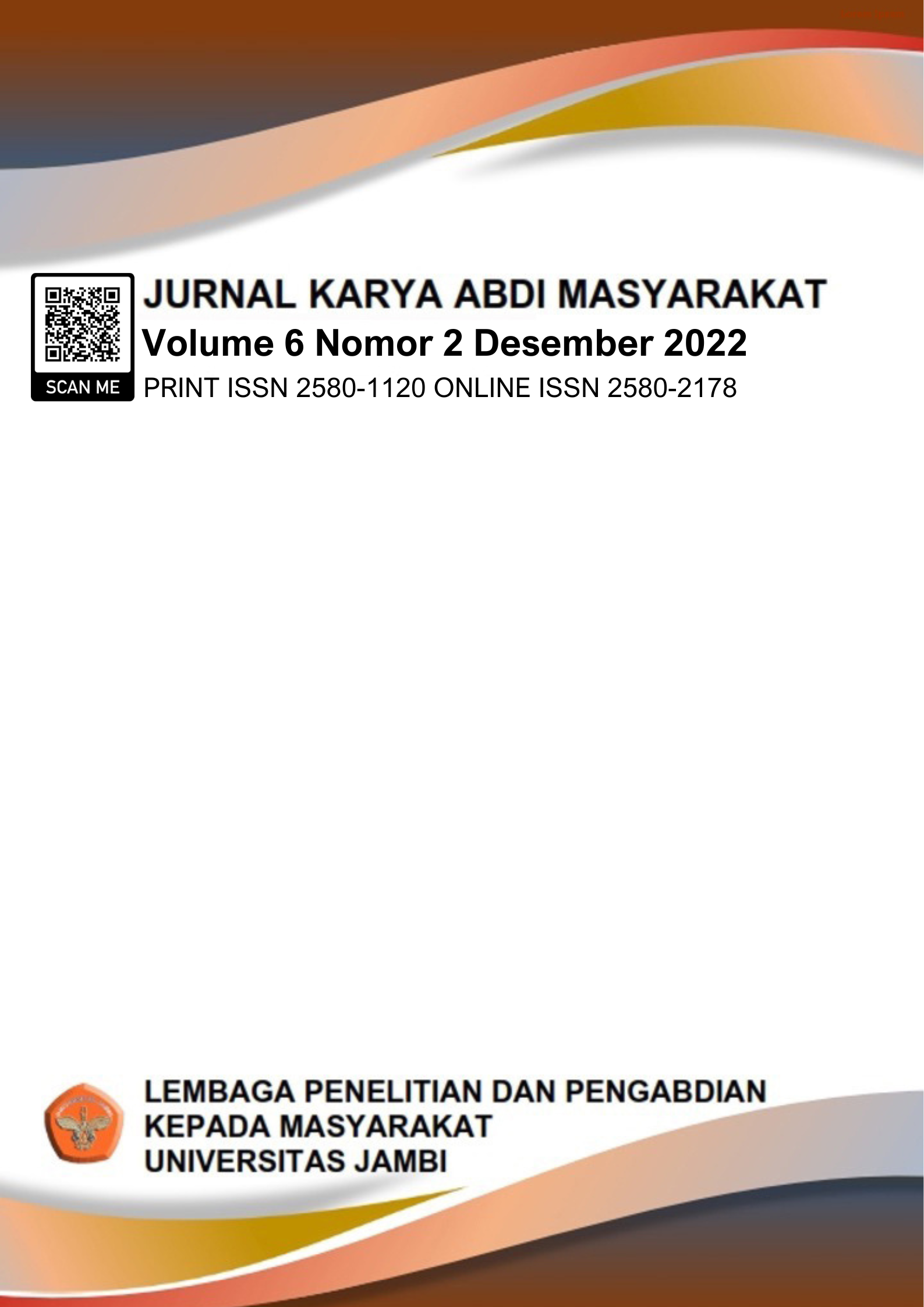Analisis Potensi Desa Sebagai Landasan Pengembangan Program Kuliah Kerja Nyata
DOI:
https://doi.org/10.22437/jkam.v6i2.22289Keywords:
Kukerta, Potensi Desa, ProgramAbstract
Potensi Pengembangan program pemberdayaan masyarakat harus berorientasi meningkatkan kesejahteraan masyarakat dengan menggunakan sumber daya yang ada. Program harus mempertimbangkan keunggulan yang dimiliki oleh suatu daerah. Oleh karena itu penting untuk melakukan analisis potensi desa sebelum mengambangkan sebuah program pengabdian kepada masyarakat. Kuliah Kerja Nyata (Kukerta) merupakan salah satu bentuk program pengabdian masyaraat yang dimotori oleh mahasiswa dan dibimbing langsung oleh Dosen Pembimbing Lapangan. Dari tahun ke tahun program Kukerta terus berkembang menyesuaikan kondisi yang ada. Dalam rangka untuk memasimalkan rancangan program yang dilaksanakan, perlu dilakukan analisis potensi desa terlebih dahulu. Dalam melaksanakan analisis potensi desa, focus pemetaan akan dilaksanakan pada sector (a) perkebunan dan pangan, (b) pariwisata, (c) tambang dan energi, (d) industry, serta (e) kesehatan. Lima indicator tersebut dijadikan sebagai acuan untuk penyusunan program. Data diperoleh melalui survey oleh mahasiswa Kukerta pada tahun 2022. Setelah itu data akan ditabulasi dan dipetakan untuk kemudian dijadikan bahan penyusunan model yang baru.
Downloads
References
Ahmad Soleh, Strategi Pengembangan Potensi Desa. Februari 2017 Vol.5 No.1
Anwas, Oos M. 2014. Pemberdayaan Masyarakat di era global. Bandung: Alfabeta
Aziz Muslim. 2019. Metodologi Pengembangan masyarakat, Yogyakarta : Teras
Mardikanto, Totok dan Poerwoko Soebiato. 2013. Pemberdayaan Masyarakat dalam Perspektif Kebijakan Publik. Bandung : Penerbit Alfabeta
Pitana, I. Gede dan Gayatri, Putu G. (2005). Sosiologi Pariwisata. Yogyakarta: Andi.
Suharto, Edi. 2010. Membangun Masyarakat Memberdayakan Rakyat. Bandung: Alfabeta
Undang-undang Nomor 2 Tahun 1989 tentang Sistem Pendidikan Nasional
Undang-undang Republik Indonesia Nomor 20 Tahun 2003 tentang Sistem Pendidikan Nasional
Peraturan Pemerintah Republik Indonesia Nomor 60 Tahun 1999 Tentang Pendidikan Tinggi
Downloads
Published
How to Cite
Issue
Section
License
Copyright (c) 2022 Agrina Agrina, Besri Nasrul, Sri Endang Kornita, Zahtamal Zahtamal, Dahlan Tampubolon, Radith Mahatma, Hengki Firmanda, Chairul Chairul, Geovani Meiwanda, Indra Lesmana, Febrialismanto Febrialismanto, Romi Kurniadi

This work is licensed under a Creative Commons Attribution 4.0 International License.
Please find the rights and licenses in Jurnal Jurnal Karya Abdi Masyarakat (JKAM).
- License
The non-commercial use of the article will be governed by the Creative Commons Attribution license as currently displayed on Creative Commons Attribution 4.0 International License.
- Authors Warranties
The author warrants that the article is original, written by stated author(s), has not been published before, contains no unlawful statements, does not infringe the rights of others, is subject to copyright that is vested exclusively in the author and free of any third party rights, and that any necessary written permissions to quote from other sources have been obtained by the author(s).
- User Rights
JKAM's spirit is to disseminate articles published are as free as possible. Under the Creative Commons license, JKAM permits users to copy, distribute, display, and perform the work for non-commercial purposes only. Users will also need to attribute authors and JKAM on distributing works in the journal.
- Rights of Authors
Authors retain the following rights:
- Copyright, and other proprietary rights relating to the article, such as patent rights,
- The right to use the substance of the article in future own works, including lectures and books,
- The right to reproduce the article for own purposes, provided the copies are not offered for sale,
- The right to self-archive the article.
- Co-Authorship
If the article was jointly prepared by other authors, the signatory of this form warrants that he/she has been authorized by all co-authors to sign this agreement on their behalf, and agrees to inform his/her co-authors of the terms of this agreement.
- Termination
This agreement can be terminated by the author or JKAM upon two months notice where the other party has materially breached this agreement and failed to remedy such breach within a month of being given the terminating party notice requesting such breach to be remedied. No breach or violation of this agreement will cause this agreement or any license granted in it to terminate automatically or affect the definition of JKAM.
- Royalties
This agreement entitles the author to no royalties or other fees. To such extent as legally permissible, the author waives his or her right to collect royalties relative to the article in respect of any use of the article by JKAM or its sublicensee.
- Miscellaneous
JKAM will publish the article (or have it published) in the journal if the articles editorial process is successfully completed and JKAM or its sublicensee has become obligated to have the article published. JKAM may conform the article to a style of punctuation, spelling, capitalization, referencing and usage that it deems appropriate. The author acknowledges that the article may be published so that it will be publicly accessible and such access will be free of charge for the readers.








